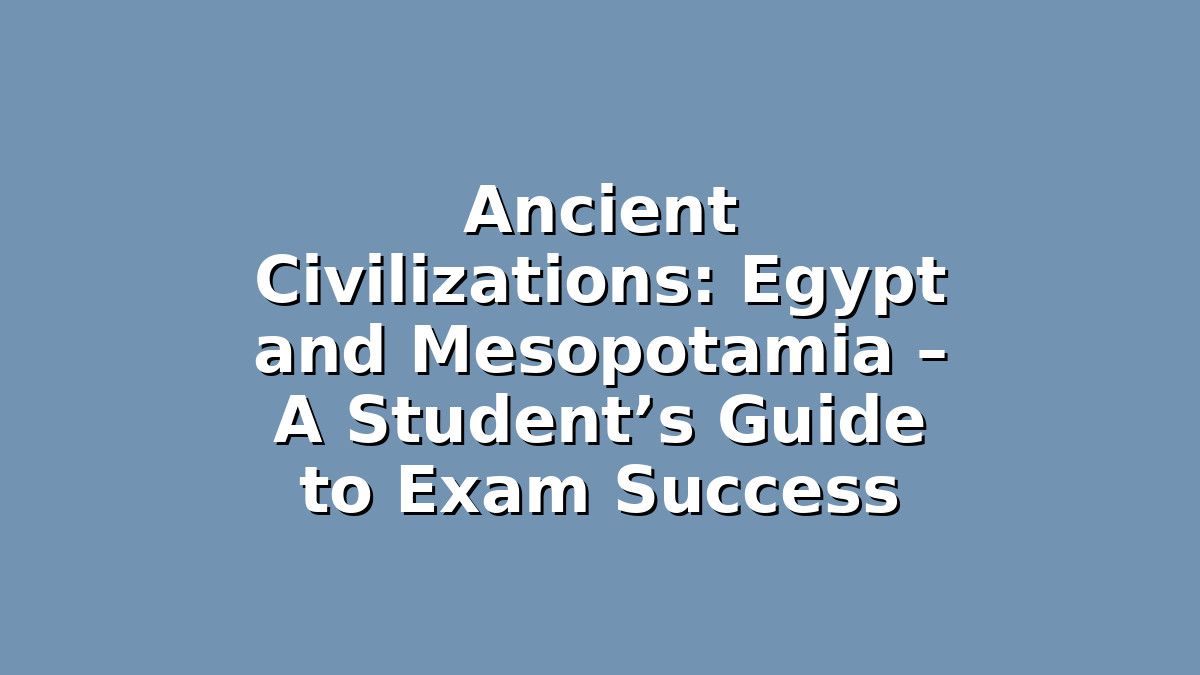When preparing for history exams, understanding the foundations of ancient civilizations is crucial. Two of the most important early cultures you’ll encounter are Ancient Egypt and Mesopotamia. These early societies not only shaped human history but also laid the groundwork for modern government, writing, religion, and technology.
If you’re a student trying to master these topics for your exams, this guide will help you dive deep into the fascinating worlds of Egypt and Mesopotamia while providing practical study tips to boost your confidence and retention. Let’s explore these incredible civilizations together and learn how to study them effectively!
—
1. Understanding Ancient Egypt: Key Features and Study Strategies
Ancient Egypt is famous for its pyramids, pharaohs, and hieroglyphic writing. But there’s much more to know beyond the iconic images.
Key Features to Focus On:
– Geography and the Nile River: The Nile was the lifeblood of Egypt. Its annual floods provided fertile soil for farming, which was essential for the civilization’s survival.
– Pharaohs and Government: Pharaohs were considered god-kings who ruled with absolute power. Understanding the role of the pharaoh and the government’s structure is important.
– Religion and Beliefs: Egyptians believed in many gods and an afterlife. Concepts like mummification and pyramids were tied to their religious beliefs.
– Writing System: Hieroglyphics were a complex form of writing used mainly by priests and scribes.
– Contributions: Architecture (pyramids, temples), advances in medicine, and mathematics.
Study Tips for Ancient Egypt:
– Create Flashcards: Make flashcards for important terms like “pharaoh,” “Nile,” “hieroglyphics,” and “mummification.” Flashcards help reinforce key vocabulary and concepts.
– Use Visual Aids: Since Egyptian culture is rich with symbols (like the Ankh or Eye of Horus), use images or drawings in your notes. Visual memory can improve recall during exams.
– Practice Timelines: Construct a timeline of major Egyptian periods (Old Kingdom, Middle Kingdom, New Kingdom) with significant events like the building of the Great Pyramid or the reign of Ramses II.
– Summarize Religion: Write a short summary explaining Egyptian beliefs about gods and the afterlife. Teaching this summary to a friend or family member can reinforce your understanding.
– Watch Documentaries: Sometimes seeing the pyramids or tombs in videos makes the information stick better than just reading it.
—
2. Exploring Mesopotamia: Civilization Between Two Rivers and How to Study It
Mesopotamia, meaning “land between rivers,” refers to the region between the Tigris and Euphrates Rivers. It’s often called the “cradle of civilization” because many firsts in human history happened here.
Key Features to Focus On:
– Geography and Environment: The unpredictable flooding of the Tigris and Euphrates shaped Mesopotamian agriculture and city life.
– City-States: Unlike Egypt’s unified kingdom, Mesopotamia was made up of independent city-states like Ur, Babylon, and Sumer.
– Government and Law: The concept of codified law, such as Hammurabi’s Code, was a significant advancement.
– Religion: Mesopotamians were polytheistic, with gods representing natural forces. Ziggurats were their religious temples.
– Writing and Innovation: The invention of cuneiform writing and advances in mathematics and astronomy originated here.
Study Tips for Mesopotamia:
– Mind Mapping: Create a mind map linking the key features of Mesopotamia — geography, government, religion, and innovations. This visual map will help organize information logically.
– Compare and Contrast: Make a chart comparing Mesopotamia and Egypt on topics like government, religion, and writing systems. This technique helps clarify similarities and differences, which are often exam questions.
– Memorize Hammurabi’s Code: Learn the main idea behind Hammurabi’s laws – “an eye for an eye” – and why it was important for justice and order.
– Practice Writing Exercises: Try copying simple cuneiform symbols or hieroglyphics to connect with the writing system physically and mentally.
– Use Mnemonics: Create mnemonic devices for remembering the names of key city-states or gods to make recall easier.
—
3. Effective Study Habits for Ancient Civilization Exams
Studying ancient civilizations like Egypt and Mesopotamia can feel overwhelming because of the sheer amount of information. Here are some proven study strategies to help you excel:
Organize Your Notes:
Keep your notes structured by themes: geography, government, religion, daily life, and achievements. This organization makes it easier to find information when reviewing.
Active Recall and Self-Testing:
Instead of just rereading your notes, quiz yourself. Try to write answers without looking at your materials. For example, ask yourself, “What role did the Nile play in Egyptian society?” or “What is the significance of cuneiform?”
Group Study Sessions:
Discussing ancient civilizations with classmates can deepen understanding. Explaining concepts to others is one of the best ways to learn.
Use Past Exam Papers:
Practice with previous exam questions related to Egypt and Mesopotamia. This helps you get familiar with question formats and identify which areas need more revision.
Create Storylines or Narratives:
History is easier to remember when you think of it as stories. For example, imagine the daily life of a Mesopotamian farmer or the building of the Great Pyramid. Storytelling can make facts more memorable.
Take Regular Breaks:
Don’t study for hours without rest. Use the Pomodoro technique—study for 25 minutes, then take a 5-minute break—to stay focused and avoid burnout.
—
Conclusion
Ancient Egypt and Mesopotamia are foundational topics in world history that offer fascinating insights into early human societies. By understanding their geography, government, religion, and lasting contributions, you build a strong base for your history exams. Remember to use active study methods like flashcards, mind maps, and self-testing to enhance your learning. Keep your notes organized, practice with past papers, and don’t hesitate to study with peers or use multimedia resources.
Most importantly, believe in your ability to learn and succeed. History is not just about memorizing facts — it’s about understanding the stories of our past. With dedication and smart study habits, you’ll be well-prepared to tackle any exam question on these amazing ancient civilizations!
Good luck, and happy studying!
—

Responses